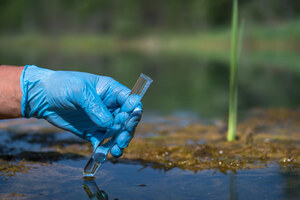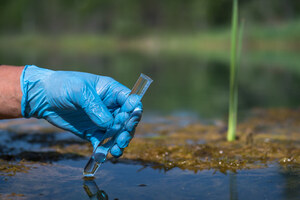LAWSUITS NEWS & LEGAL INFORMATION
Camp LeJeune Water Contamination
Were you looking for Water Contamination Lawsuits lawsuits?
By Jane Mundy
Anyone who drank and bathed in contaminated water at Camp Lejeune or Marine Corps Air Station New River in North Carolina between 1953 to 1987 and suffered injuries or death from exposure to toxic chemicals in the water can now bring a claim within two years from when the Camp Lejeune Justice Act of 2022 becomes effective.
Once the Camp Lejeune Justice Act (CLJA) becomes federal law (the bill is expected to be signed by President Joe Biden by July 2022), Camp Lejeune water contamination victims may finally be eligible for compensation. Many individuals who had their claims inappropriately denied or delayed can now file a Camp Lejeune lawsuit in federal court. Previously, North Carolina’s strict 10-year statute of repose denied most families the ability to sue in court.
Camp Lejeune is a huge Marine Corps base and military training facility on 250 square miles in Onslow County, North Carolina. Since 1942, military service members and their families, civilian employees and contractors worked there and called it home. Camp Lejeune had its own public water system with potable water: For at least 34 years -- from 1953 to 1987-- the public water supply at Camp Lejeune Marine Corps Base in North Carolina was contaminated with toxic chemicals that more than a million people drank and bathed in.
TCE was commonly used as solvent and degreaser on metal military equipment. The EPA’s maximum safe level for TCE in potable water is 5 ppb. The Camp Lejeune water supply was contaminated with TCE as high as 1,400 ppb. TCE has been used as a solvent and also to kill insects as a fumigant. Human and animal studies show a link between a mother’s exposure to TCE during pregnancy and congenital heart defects – which are common from mothers who drank and bathed in the contaminated water at Camp Lejeune.
Thousands of marines and civilians have suffered a range of severe illnesses and many have died from exposure to the contaminated drinking water. It has been linked to the following injuries and illnesses:
As early as the 1940s, wells would sometimes be found with TCE, PCE, and other toxic chemicals. When this happened, the water was deemed unpotable and the wells were shut down or restricted to non-drinking and non-culinary use. So the government and the Navy knew the water was contaminated.
More than 15 years ago, an expert for the federal government (defendant) in Camp Lejeune water contamination lawsuits contended that environmental scientists and engineers did not address TCE, PCE, and other chlorinated solvents as potential soil and groundwater contaminants until the early 1980s. Further, that expert stated there was a “prevailing belief” that chlorinated solvents would evaporate or be assimilated into the soil and not contaminate the water.
A former Marine and Camp Lejeune resident in the 1970s filed a PFAS water contamination lawsuit in May 2022 against manufacturers of firefighting foam. James Hart’s lawsuit claims that the use of firefighting foam on the base caused PFAS contamination in the water at more than 2,400 times the maximum safe limit and because of his exposure to PFAS he developed kidney cancer in 2017.
Today, the defendant, aka government, also designed a law allowing victims to bring compensation claims. Plaintiff attorneys believe that the government will offer a Camp Lejeune settlement before these lawsuits go to trial.
Last updated on
FREE CAMP LEJEUNE LAWSUIT EVALUATION
Send your Camp LeJeune claim to a lawyer who will review your claim at NO COST or obligation.
GET LEGAL HELP NOW
GET LEGAL HELP NOW
Camp Lejeune is a huge Marine Corps base and military training facility on 250 square miles in Onslow County, North Carolina. Since 1942, military service members and their families, civilian employees and contractors worked there and called it home. Camp Lejeune had its own public water system with potable water: For at least 34 years -- from 1953 to 1987-- the public water supply at Camp Lejeune Marine Corps Base in North Carolina was contaminated with toxic chemicals that more than a million people drank and bathed in.
Contaminated Water at Camp Lejeune
In the 1980s, environmental testing at Camp Lejeune discovered that the water supply was dangerously contaminated. The Marine Corps determined that from approximately 1953 through 1987, the water had been heavily contaminated with volatile organic compounds and carcinogenic chemicals proven to be harmful to humans, including:- Benzene
- Trichloroethylene (TCE)
- Tetrachloroethylene
- Perchloroethylene (PCE)
- Vinyl Chloride (VC)
TCE was commonly used as solvent and degreaser on metal military equipment. The EPA’s maximum safe level for TCE in potable water is 5 ppb. The Camp Lejeune water supply was contaminated with TCE as high as 1,400 ppb. TCE has been used as a solvent and also to kill insects as a fumigant. Human and animal studies show a link between a mother’s exposure to TCE during pregnancy and congenital heart defects – which are common from mothers who drank and bathed in the contaminated water at Camp Lejeune.
Thousands of marines and civilians have suffered a range of severe illnesses and many have died from exposure to the contaminated drinking water. It has been linked to the following injuries and illnesses:
- Aplastic Anemia
- Bladder Cancer
- Cardiac Defects
- Kidney Cancer
- Leukemia
- Liver Cancer
- Multiple Myeloma
- Myelodysplastic Syndrome
- Non-Hodgkin's Lymphoma
- Parkinson's Disease
- Systemic Sclerosis/Scleroderma
- Breast Cancer
- Esophageal Cancer
- - Female Infertility
- - Hepatic Steatosis
Camp Lejeune Lawsuits
Camp Lejeune water contamination lawsuits claim that the water supply at Camp Lejeune was contaminated between the 1960s and 1980s, and that the United States negligently caused injury or death by allowing contaminants into water supply and failed to warn people of side effects that included death.As early as the 1940s, wells would sometimes be found with TCE, PCE, and other toxic chemicals. When this happened, the water was deemed unpotable and the wells were shut down or restricted to non-drinking and non-culinary use. So the government and the Navy knew the water was contaminated.
More than 15 years ago, an expert for the federal government (defendant) in Camp Lejeune water contamination lawsuits contended that environmental scientists and engineers did not address TCE, PCE, and other chlorinated solvents as potential soil and groundwater contaminants until the early 1980s. Further, that expert stated there was a “prevailing belief” that chlorinated solvents would evaporate or be assimilated into the soil and not contaminate the water.
A former Marine and Camp Lejeune resident in the 1970s filed a PFAS water contamination lawsuit in May 2022 against manufacturers of firefighting foam. James Hart’s lawsuit claims that the use of firefighting foam on the base caused PFAS contamination in the water at more than 2,400 times the maximum safe limit and because of his exposure to PFAS he developed kidney cancer in 2017.
Today, the defendant, aka government, also designed a law allowing victims to bring compensation claims. Plaintiff attorneys believe that the government will offer a Camp Lejeune settlement before these lawsuits go to trial.
CAMP LEJEUNE WATER CONTAMINATION Legal Help
If you or a loved one has suffered similar damages or injuries, please fill in our form and your complaint will be sent to a lawyer who may evaluate your claim at no cost or obligation.Last updated on
CAMP LEJEUNE LEGAL ARTICLES AND INTERVIEWS
Camp LeJeune in Denial

Camp Lejeune Litigation on Track, First Settlements Reached, and Unpublished Cancer Study

Camp LeJeune Master and Short Form Complaint


May 26, 2024
More than 2,000 claims through the Camp Lejeune Family Member Program have been denied by the U.S. Department of Veterans Affairs. According to VA officials, claims were filed by qualifying family members who lived at the North Carolina military base during 1953 to 1987. They were relying on compensation to cover their medical bills to treat serious illnesses associated with the contaminated water at Camp LeJeune. READ MORE
Camp Lejeune Litigation on Track, First Settlements Reached, and Unpublished Cancer Study

December 1, 2023
November has been a big month for Camp Lejeune attorneys. Litigation is on track – literally. Discovery is divided into two tracks of five illnesses each and the first lawsuits are slated for 2024. The first government settlements have finally been accepted and Reuters reported an unpublished study finding elevated Camp Lejeune cancer rates at the U.S. military base, which could result in even more Camp Lejeune lawsuits. READ MORE
Camp LeJeune Master and Short Form Complaint

October 30, 2023
To help hundreds and thousands of Camp LeJeune plaintiffs claiming contaminated water caused serious health issues, lawyers have filed a Master Complaint outlining and defining all their common allegations and claims. And to streamline litigation for bringing new Camp LeJeune lawsuits, plaintiffs can take some of these allegations and claims and adopt them in a Short Form complaint. Each plaintiff, however, is still required to individually establish that their injury is “at least as likely as not” caused by exposure to water on the base. READ MORE
READ MORE Water Contamination Settlements and Legal News
READ MORE Environment Settlements and Legal News
READ MORE Personal Injury Settlements and Legal News
READ MORE Environment Settlements and Legal News
READ MORE Personal Injury Settlements and Legal News

READER COMMENTS
john MACLEAN
on